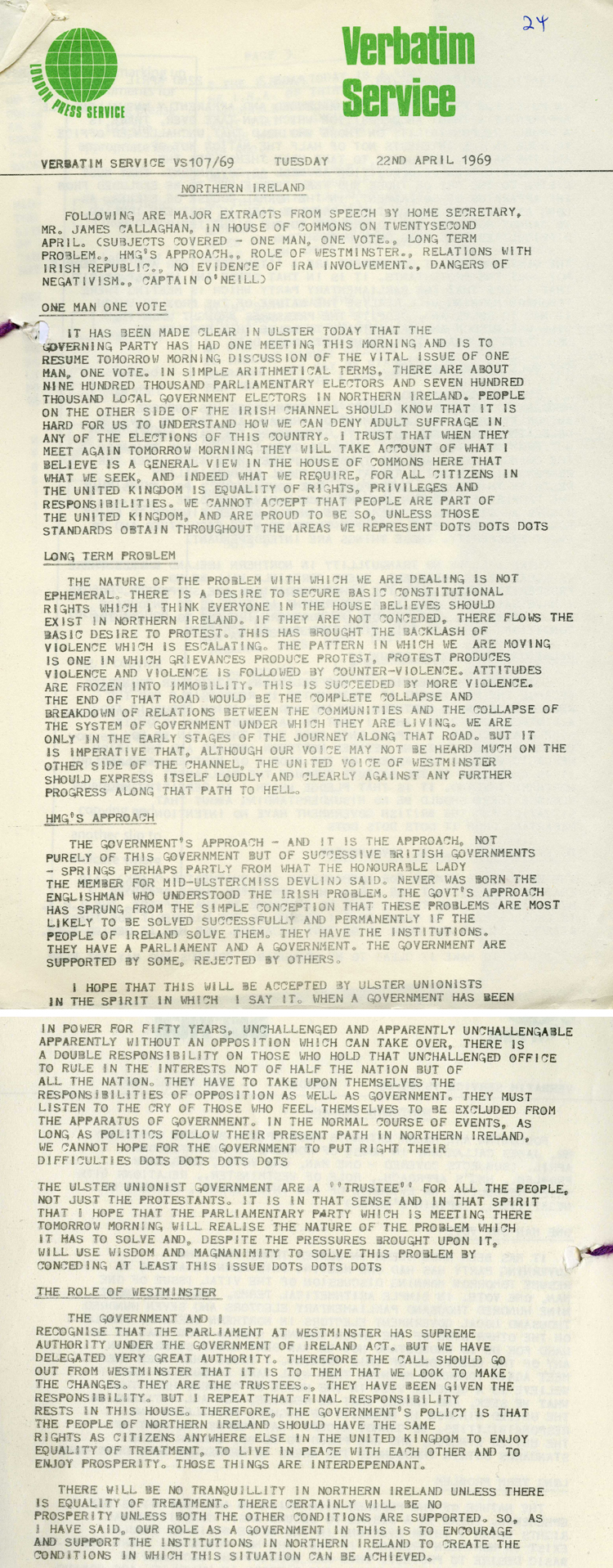
Extract from a speech by Home Secretary James Callaghan to the House of Commons on the question of Northern Ireland, April 1969 (CJ 3/52)
Transcript – extracts from Callaghan’s speech
VERBATIM SERVICE VS107/69 TUESDAY 22ND APRIL 1969
Following are major extracts from speech by Home Secretary, Mr. James Callaghan, in House of Commons on twenty second April. (Subjects covered: One man, one vote, Long-term problem, HMG’s approach, Role of Westminster, Relations with Irish Republic, No evidence of IRA involvement, Dangers of negativism, Captain O’Neill)
ONE MAN ONE VOTE
It has been made clear in Ulster today that the governing party has had one meeting this morning and is to resume tomorrow morning discussion of the crucial issue of one man, one vote. In simple arithmetical terms there are about nine hundred thousand parliamentary electors and seven hundred thousand local government electors in Northern Ireland. People on the other side of the Irish Channel should know that it is hard for us to understand how we can deny adult suffrage in any of the elections of this country. I trust that when they meet again tomorrow morning they will take account of what I believe is a general view in the House of Commons here that what we seek, and indeed, what we require, for all citizens in the United Kingdom is equality of rights, privileges and responsibilities. We cannot accept that people are part of the United Kingdom, and are proud to be so, unless those standards obtain throughout the areas we present.
LONG-TERM PROBLEM
The nature of the problem with which we are dealing is not ephemeral. There is a desire to secure basic constitutional rights which I think everyone in the House believes should exist in Northern Ireland. If they are not conceded, there flows the basic desire to protest. This has brought the backlash of violence which is escalating. The pattern in which we are moving is one in which grievances produce protest. Protest produces violence and violence is followed by counter-violence. Attitudes are frozen into immobility. This is succeeded by more violence. The end of that road would be the complete collapse and breakdown of relations between communities and the collapse of the system of government under which they are living. We are only in the early stages of the journey along that road, but it is imperative that, although our voice may not be heard much on the other side of the Channel, the united voice of Westminster should express itself loudly and clearly against any further progress along that path to Hell.
HMG’s APPROACH
The government’s approach – and it is the approach, not purely of this government, but of successive British Governments – springs perhaps partly from what the Honourable Lady, the member for mid-Ulster (Miss Devlin) said. Never was born the Englishman who understood the Irish problem. The government’s approach has sprung from the simple conception that these problems are most likely to be solved successfully and permanently if the people of Ireland solve them. They have the institutions. They have a parliament and a government. The government are supported by some and rejected by others.
I hope that this will be accepted by Ulster Unionists in the spirit in which I say it. When a government has been in power for fifty years, unchallenged and apparently unchallengable apparently without an opposition which can take over, there is a double responsibility on those who hold that unchallenged office to rule in the interests not of half of the nation but of all the nation. They have to take upon themselves the responsibilities of opposition as well as government. They must listen to the cry of those who feel themselves to be excluded from the apparatus of government. In the normal course of events, as long as politics follow their present pattern in Northern Ireland, we cannot hope for the government to put right their difficulties.
The Ulster Unionist Government are a ‘Trustee’ for all the people, not just the Protestants. It is in that sense and in that spirit that I hope that the parliamentary party which is meeting there tomorrow morning, will realise the nature of the problem which it has to solve and, despite the pressures brought upon it, will use wisdom and magnanimity to solve this problem by conceding at least this issue.
THE ROLE OF WESTMINSTER
The government and I recognise that the Parliament at Westminster has supreme authority under the Government of Ireland Act, but we have delegated very great authority. Therefore the call should go out from Westminster that it is to them that we look to make the changes. They are the trustees. They have been given the responsibility. But I repeat that final responsibility rests in this house, therefore, the government’s policy is that the people of Northern Ireland should have the same rights as citizens anywhere else in the United Kingdom to enjoy equality of treatment to live in peace with each other and to enjoy prosperity. Those things are interdependent.
There will be no tranquillity in Northern Ireland unless there is equality of treatment. There certainly will be no prosperity unless both the other conditions are supported. So, as I have said, our role as a government in this is to encourage and support the institutions in Northern Ireland to create the conditions in which this situation can be achieved.
